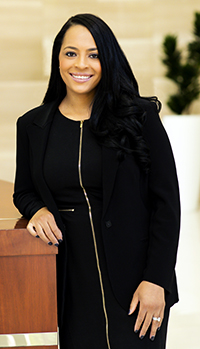Vaulting into Action
Former Olympic gymnast Tasha Schwikert uses her Boyd Law School degree to positively impact female athletes

By Lisa Jacob
As an elite gymnast, Tasha Schwikert’s discipline and training helped her earn numerous national titles and medals. Just as importantly, her experience and determination fueled her advocacy for female athletes and propelled the launch of her law career.
The Las Vegas native was 15 years old when she was a member of the bronze-winning U.S. women’s gymnastics team at the 2000 Olympics in Sydney. Four years later, she accepted a scholarship to UCLA, where she won two NCAA all-around national championships (2005 and 2008), and where she graduated with a sociology degree in 2009.
Schwikert then accepted a position with a sports management agency, assisting with contract negotiations, sponsorship, and marketing deals for female Olympic athletes. But when it was time for the in-house attorneys to draw up legal agreements for her clients, the process often stalled as they focused mostly on the NBA and Major League Baseball players the firm represented.
“I felt like sometimes my contracts would get put on the bottom of the pile because there were bigger deals to be done,” Schwikert recalls. “I loved helping these women, but I felt like without a law degree, there was only so much I could do. That was the moment where I was like, ‘I need to go to law school and get a law degree so I don’t have to wait on someone else to get this stuff done.’”
After two years with the sports management agency, Schwikert went after that law degree. Choosing to attend the UNLV William S. Boyd School of Law was easy: She wanted to be near her family, and her initial desire was to practice law in her hometown. What made her slightly uneasy was the three-year gap in her education, not to mention an anticipated age gap between her and other first-year Boyd Law School students.
That uneasy feeling dissipated shortly after Schwikert arrived on campus.
“It was nice to see that Boyd had a diverse class of students from all age ranges, people who were my age or had some real-life work experience prior to law school,” Schwikert says. “Many already had careers and law was their second career. I was able to relate to a lot of my classmates.”
One area where Schwikert had a leg up was understanding and accepting the reality that earning a law degree required intense focus and discipline. The onetime elite athlete drew upon her many years of gymnastics training—almost eight hours a day, six days a week—to confront the rigors of law school.
“Once you start [law school], you have to make it your main focus,” she says. “There were times when I was in the library studying for hours or in class not wanting to read any more cases, or times when I was simply stressed out. But I had to keep pushing, because giving up wasn’t an option.”
Schwikert completed her J.D. in 2015, and in 2019 she moved to Dallas, where she is now an associate at Munck Wilson Mandala’s corporate section, specializing in mergers and acquisitions, real estate, and construction. While her gymnastics training helped prepare her for law school, it was law school that prepared her for another challenge, one that was immensely personal.
Passionate about advocating for institutional change within USA Gymnastics and the United States Olympic Committee, Schwikert became co-chair of a special committee that represented more than 500 female athletes who were sexually assaulted by former USA Gymnastics team doctor Larry Nassar. She and her sister are among those survivors.
Schwikert was one of three former U.S. gymnasts to testify before Texas’ Senate Committee on State Affairs in May 2019 to support a bill to give child sex abuse victims more time to sue organizations that failed to protect them. The bill passed unanimously in both houses and was signed into law a month later.
“I drew from my gymnastics experiences during that testimony, but being a lawyer really helped calm me because [the situation] was intimidating and a bit nerve-racking,” Schwikert says. “But being an attorney, I was able to stay on task and get my point across clearly. All the writing and presentation tasks and oral argument exercises that I had to do [at the Boyd School of Law] helped me feel calm and confident. I was ready to be impactful and tell my story.”
Building upon her work as an advocate for athletes, Schwikert is now leading Munck Wilson Mandala’s first-ever sports law division. While her legal career and role as a wife (she’s married to former UNLV basketball player and current Dallas Mavericks player development coach Mike Moser) and mother of two young children command a great deal of her time, Schwikert says she remains committed to helping athletes who are victims of sexual abuse.
“I hope I can do more to make sure athletes are protected, and make gymnastics safer—all sports safer, really. But obviously gymnastics is at the core of my being. It was my entire life.”